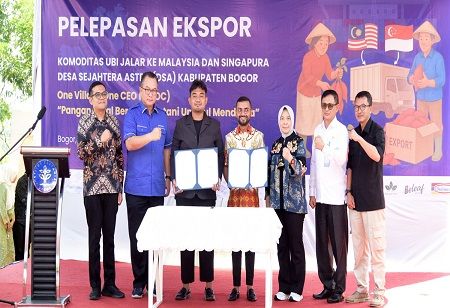- IPB University exports 65+ tons of purple sweet potatoes to Malaysia and Singapore, empowering 13 villages through its One Village One CEO (OVOC) program.
- The OVOC initiative now spans 1,430 villages, engaging students and alumni as village CEOs to boost agri-innovation, market access, and rural entrepreneurship.
- IPB aims to become an 'Innopreneur University', driving exports of agricultural innovations like pesticide-free chili to Japan and organic planting media to 11 countries.
IPB University continues to show its seriousness in empowering society with the utilization of local potential, especially in the form of developing agricultural products in villages through the One Village One CEO (OVOC) program.
Recently, IPB University initiated exports of purple sweet potatoes to Malaysia and Singapore by farmers from villages around the campus. The symbolic export launching ceremony was held at the Agribusiness and Technology Park (ATP) of IPB University in Bogor on (7/22).
Since 2024, IPB University, represented by the Directorate of Agromaritime Community Development (DPMA), has developed a sweet potato business ecosystem that now reaches more than 13 villages in Bogor Regency. This project has been able to penetrate the export market with a total of more than 65 tons of sweet potatoes in the first semester of 2025.
As of that time, IPB University Rector Prof Arif Satria stated that by 2025, the OVOC program had been conducted in 1.430 villages in Indonesia. The program engages final-year students and alumni as village CEOs, providing access to technology, markets, and financing for the villagers. "A CEO is not a position, but rather a learning process from the time students join IPB University for the first time. Based on talent mapping findings, 31 percent of IPB University students hope to become entrepreneurs", he explained.
"This is all the more respectable because entrepreneurs are not only looking for profit but they are producing value for society. They create jobs, capitalize on IPB University innovations, and provide social and economic contributions", added Prof Arif.
Also Read: MSU Extension Partners with Indian org for Global Agricultural Education
Further, he mentioned that IPB University is working actively to export Indonesian agricultural produce to the United States, Pakistan, India, and Malaysia, and chili peppers to Japan, due to innovation in removing pesticide residues with the use of nano-technology. Together with PT Astra International, IPB University is also processing Cipanas Garut's goat manure waste as planting media which is now exported to 11 countries. Garut coffee products have also reached eight countries' markets.
"IPB University's vision today is to become an Innopreneur University that produces meaningful innovations. We not only want to be the 'kitchen of the world' but to 'feed the world' by bringing about agricultural innovations", said Prof Arif. In the same event, Director General of National Export Development at the Ministry of Trade of the Republic of Indonesia, Fajarini Puntodewi, thanked IPB University for its dedication in assisting national export development.
Ilham Indanu Sitepu, a graduate of IPB University's Department of Islamic Economics batch 57, and the CEO of OVOC, said the program has a direct impact on the economic development of farmers. "Purple sweet potato export success is the result of synergy between IPB University, the government, and private sector players such as Desa Sejahtera Astra, which sponsors five villages as production partners. Key stakeholders are fully behind this ecosystem", he added.
During the first stage, the products exported are still raw materials. But in the future, Danu plans to establish downstream products by partnering with sweet potato chip factories, so the villages will have processed sweet potato products competitive in the international market.

